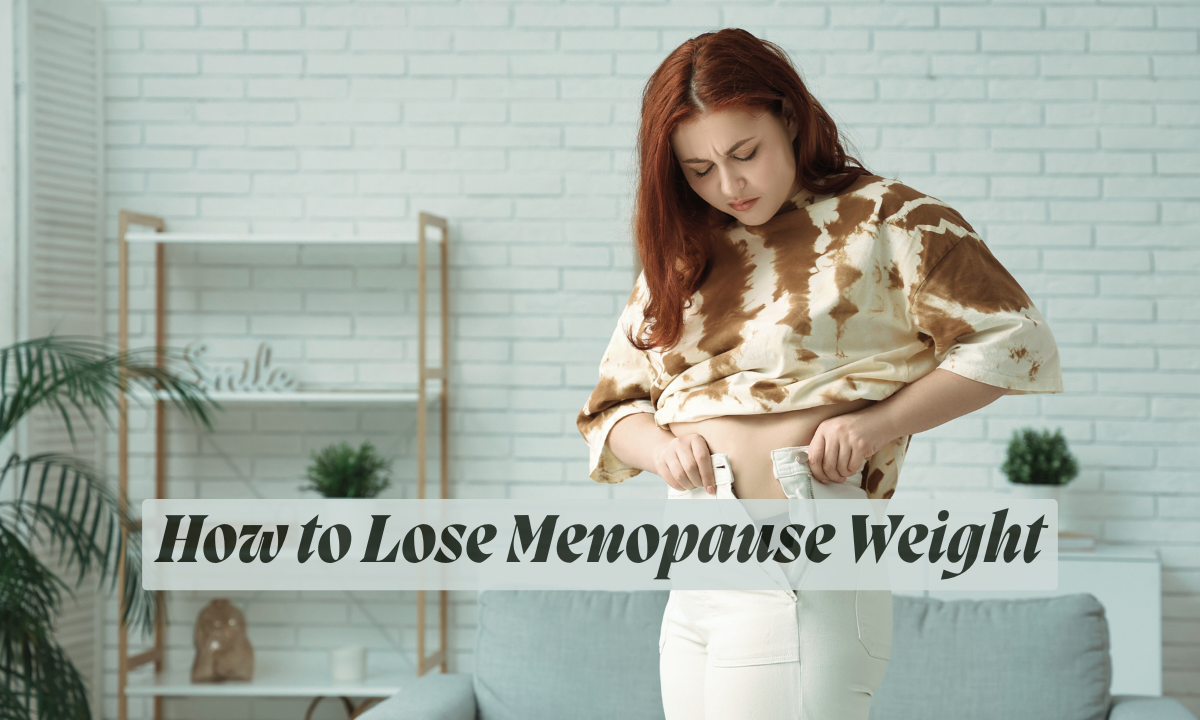How to Lose Menopause Weight with Simple, Effective Tips
Interlude Hypnotherapy

Published: April, 2025
Have you noticed the scale tipping higher despite your best efforts, especially as you enter menopause? Many women face the frustrating reality of weight gain during this life stage. But what if you could stop feeling powerless and take control of your body once again? With the right tools and knowledge, managing menopause weight gain is not just possible, but empowering.
Menopause is a natural transition, but it brings with it a host of challenges, one of the most common being weight gain. This article explores the causes behind menopause-related weight gain, shares actionable strategies to address it, and highlights ways to adopt healthier lifestyle habits that truly work. If you’ve struggled with the changes menopause brings, read on to discover how to lose menopause weight confidently and sustainably.
Why Does Menopause Cause Weight Gain?
First, it’s important to understand why menopause often leads to weight gain. Hormonal changes play a significant role. Oestrogen levels drop during menopause, which interferes with insulin regulation and fat distribution. This often leads to the accumulation of fat in the abdominal area, sometimes referred to as “menopause belly bloat.”
Additionally, metabolism naturally slows with age, making it harder to burn the calories you once did with ease. Muscle mass also decreases as we age, further reducing the body’s calorie-burning capacity. Much of this is gradual, which is why many women don’t notice the creeping effects until the pounds have already gathered.
Stress and sleep deprivation can also amplify weight gain. When cortisol levels are high due to stress, the body tends to store more fat, particularly in the midsection. Combined with poor sleep quality—which is common during menopause due to hot flushes and night sweats, as well as anxiety and mood shifts—the body struggles to regulate both hunger and energy balance.
Finally, emotional eating often escalates during menopause. When hormonal fluctuations affect mood, it’s all too easy to turn to comfort foods for relief, creating a cycle of overeating and weight gain.
Crafting a Menopause-Friendly Diet
Understanding the link between diet and weight gain is essential. Many traditional approaches to weight loss just don’t cut it when it comes to menopause, as the hormonal and metabolic changes require a more targeted and thoughtful approach. A “menopause diet UK” can safeguard your health while helping to manage your weight.
Focus on nutrient-dense whole foods. Vegetables, fruits, whole grains, lean proteins, and healthy fats like avocado and olive oil should form the backbone of your meals. These foods help stabilise blood sugar levels and keep cravings at bay.
Pay close attention to portion sizes. While food quality matters, overeating even healthy foods can contribute to weight gain. Consider using smaller plates to naturally reduce portion sizes, or try intuitive eating to learn how to recognise when you’re truly hungry.
Hydration is another piece of the puzzle. Some women mistake thirst for hunger, leading to unnecessary snacking. Aim to drink plenty of water throughout the day, and reduce sweetened beverages which can sneak extra calories into your diet.
Including foods rich in fibre can help combat “menopause belly bloat” by improving digestion and reducing water retention. Think oats, lentils, and plenty of fresh vegetables for a bloat-free belly.
Lastly, consider a “7-day diet plan for menopause” as a short-term kickstart to healthier eating habits. Start the week with high-protein breakfasts, such as Greek yoghurt with berries, enjoy hearty salads packed with greens and chickpeas for lunch, and include grilled fish or chicken with roasted vegetables for dinner. Rotate these meals with creative additions and snacks like nuts, seeds, and boiled eggs to keep things exciting.
The Best Exercises for Menopause Weight Loss
Exercise, when paired with a balanced diet, can be one of the most effective tools for tackling menopause weight gain. However, it’s essential to focus on the right types of activity to see results.
For abdominal fat, specifically “the best exercise for menopause belly” is a blend of cardio, strength training, and flexibility work. High-Intensity Interval Training (HIIT) is particularly effective at burning fat, including belly fat, while improving metabolism. A 20-minute HIIT session three times a week can make a noticeable impact.
Strength training is often overlooked but is a must during menopause. Building and maintaining muscle mass improves your resting metabolic rate, meaning your body burns more calories even when you’re not exercising. You don’t need heavy weights to get started—even resistance bands or small dumbbells can work wonders. Focus on full-body workouts that target all major muscle groups.
To complement these, activities like yoga or Pilates offer both physical and mental benefits. Yoga can relieve the stress that often contributes to weight gain while improving flexibility and posture. Bonus? Yoga can also address menopausal symptoms like anxiety and help with digestion, tackling “menopause belly bloat” in subtle ways.
For those who prefer gentler options, consider brisk walking, swimming, or cycling. These are lower-impact ways to stay active and keep your joints healthy as your body changes. Aim for a mix of aerobic and resistance exercises to maximise results. Remember, the goal is consistency, so find activities you enjoy.
Managing Stress and Emotional Eating
Stress is a major factor in menopause weight gain, and addressing it is crucial for long-term wellness. High levels of cortisol not only encourage fat storage but also make you more likely to indulge in comfort foods. Learning stress management techniques can help.
Mindfulness practices, like meditation, are effective ways to stay grounded and relaxed. Even taking five minutes a day to focus on deep breathing can reduce cortisol levels. Journaling is another useful tool, providing a space to reflect on triggers and release pent-up emotions.
Make time for self-care. Whether it’s reading, gardening, or connecting with friends, engaging in activities that make you happy can help mitigate emotional eating. For some women, hypnotherapy can be a game-changer, helping break the cycle of overeating and cultivating a healthier relationship with food.
If you find yourself reaching for snacks during stressful moments, ask whether you’re physically hungry or just bored. Keeping healthy snacks like chopped veggies, hummus, or unsweetened yoghurt on hand can help satisfy cravings without derailing your progress. Practising portion control is key as well; allow yourself an occasional treat, but mindful moderation is your best ally.
Supporting Your Journey
Weight gain during menopause is a frustrating, complex issue, but it’s also a transition that can be managed with the right tools and mindset. By adopting a tailored approach to healthy eating through a menopause-friendly diet, incorporating effective exercises like strength training and yoga, and addressing stress, you can avoid the energy dips and frustration that often accompany menopause.
If you’re ready to take things further, exploring a “7-day diet plan for menopause” or personalised fitness programmes can give you the structure and direction to see faster results. Plus, focusing on enriched communication with health professionals, including hypnotherapy practitioners, provides targeted solutions to emotional or behavioural obstacles standing in your way.
A Healthier, Happier You
Menopause may change how your body responds to diet and exercise, but it doesn’t mean surrendering control. Instead, it’s an opportunity for transformation. With dedication to self-care, a practical action plan, and a focus on consistency, you can combat weight gain and thrive.
Imagine waking up with the energy to tackle the day confidently, unrestricted by anxiety about weight or health. By addressing the multiple facets of menopause weight gain—from diet adjustments and regular exercise to stress management and emotional well-being—you’ll reclaim control.
For more effective results, you can seek the assistance of a specialist. I am Farah-Naz Khan, a certified Virtual Gastric Band & HypnoBand® Weight Loss Practitioner and a Certified Hypno Menopause Practitioner®. Whether in a calm and welcoming environment or from the comfort of your own home via online sessions, my services are designed to help you overcome challenges. Don’t delay, Book your consultation session today and take the first step towards feeling empowered, healthy, and confident.






